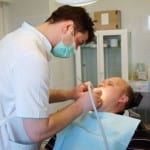 Roughly speaking, a tooth can be divided into two parts: the outer crown and the inner root. It is these roots which anchor the crown into your jaw. Your tooth contains within it a remarkable ‘root canal’ system, which stretches all the way from the exposed enamel of the outer crown all the way down to the roots themselves. Within this complex system is a ‘pulp chamber’, which houses the living tissue that is your dental pulp. If the pulp gets infected, your tooth is effectively dying and if this is not treated you could lose your tooth. Root canal surgery is essentially the process of cleaning out the bacteria that can cause such an infection.
Roughly speaking, a tooth can be divided into two parts: the outer crown and the inner root. It is these roots which anchor the crown into your jaw. Your tooth contains within it a remarkable ‘root canal’ system, which stretches all the way from the exposed enamel of the outer crown all the way down to the roots themselves. Within this complex system is a ‘pulp chamber’, which houses the living tissue that is your dental pulp. If the pulp gets infected, your tooth is effectively dying and if this is not treated you could lose your tooth. Root canal surgery is essentially the process of cleaning out the bacteria that can cause such an infection.
How does a tooth become infected?
For bacteria to make its way to your tooth pulp, the outer crown must first be penetrated. Tooth decay or damage can easily grant bacteria access to your tooth pulp, as can a leaked filling. It is important to see your dentist should a filling break in order to prevent a tooth infection.
What happens during root canal surgery?
Firstly, X-rays will be taken of the damaged tooth to help identify the number of roots in your tooth and any symptoms of infection. A local anaesthetic will be administered and a rubber dam may be placed over your infected tooth to help keep the tooth dry. This will prevent re-infection and aiding us in administering the procedure. The infected pulp with then be removed and any abscesses will be drained. The root canal system itself will be cleansed, closed up and then a temporary filling will be placed over the tooth. You will then be required for a second appointment to make sure re-infection has not occurred. Finally, a permanent filling will be fitted.
Does it hurt?
Thanks to the local anaesthetic, you should feel very little during the actual surgery. Following surgery your tooth may be a little tender or uncomfortable, but this really is nothing when compared to the excruciating pain of an infected tooth. For more information please contact the team at City Dental in the very heart of Leeds.
Tags: oral infection, Root canal treatment Central Leeds, Tooth infection Leeds, tooth infection treatment







